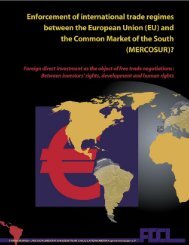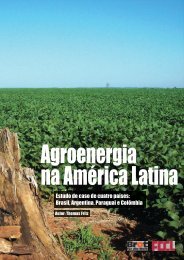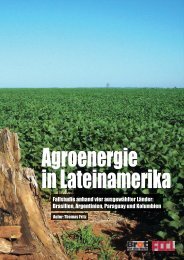(EU) and the Common Market of the South (MERCOSUR)? - FDCL
(EU) and the Common Market of the South (MERCOSUR)? - FDCL
(EU) and the Common Market of the South (MERCOSUR)? - FDCL
Create successful ePaper yourself
Turn your PDF publications into a flip-book with our unique Google optimized e-Paper software.
108<br />
Providing cheaper access to water for poorer segments <strong>of</strong> <strong>the</strong> population by<br />
employing tax money for water pipes would <strong>the</strong>n be prohibited as a “discriminatory<br />
measure” by <strong>the</strong> international treaty, unless it is granted to <strong>the</strong> same extent to<br />
European suppliers: Brazilian taxpayers' money as a “subsidy” for a basic human<br />
necessity: Access to water, would <strong>the</strong>n have to be granted to <strong>the</strong> transnational corporations<br />
as well.<br />
In general <strong>the</strong> primacy <strong>of</strong> <strong>the</strong> international trade <strong>and</strong> investment regime rules<br />
over national legislation <strong>and</strong> controls regarding <strong>the</strong> allocation <strong>of</strong> public goods like<br />
water supply. Howard Mann from International Institute for Sustainable Development<br />
(IISD) argues <strong>the</strong> following with respect to <strong>the</strong> impact <strong>of</strong> international trade <strong>and</strong> investment<br />
regimes on <strong>the</strong> water sector:<br />
“While a state will not lose jurisdiction in a strict legal sense over its water due<br />
to trade or investment regimes, two things are clear: First, <strong>the</strong>re is a significant<br />
risk that <strong>the</strong> existing agreements place very strong limits on how that jurisdiction<br />
can be exercised, <strong>and</strong> in whose interests it must be exercised. Second,<br />
ongoing negotiations on trade <strong>and</strong> investment, including in <strong>the</strong> services sector,<br />
may place even greater restrictions on <strong>the</strong> ability <strong>of</strong> governments to manage<br />
water resources <strong>and</strong> services. These agreements can <strong>the</strong>refor have significant<br />
impacts on local <strong>and</strong> regional water management decisions. And on traditional<br />
users <strong>of</strong> water resources. [...]<br />
[T]rade law generally does not, today, m<strong>and</strong>ate <strong>the</strong> privatization <strong>of</strong> public services.<br />
(The role <strong>of</strong> international banks <strong>and</strong> aid is not discussed here.) However,<br />
if contracts <strong>and</strong> extant laws <strong>and</strong> regulations do not explicitly recognize <strong>and</strong><br />
give priority to <strong>the</strong> rights <strong>and</strong> needs <strong>of</strong> local citizens, or are not sufficient to<br />
ensure long-term water quality management, <strong>the</strong> existing international trade<br />
<strong>and</strong> investment rules will reinforce any weaknesses <strong>and</strong> imbalances by ensuring<br />
<strong>the</strong> investor’s rights can be enforced under international law, <strong>and</strong> outside<br />
<strong>of</strong> national legal systems. This makes subsequent changes in contract terms<br />
<strong>and</strong> local or national laws more difficult, <strong>and</strong> potentially too costly to undertake.<br />
The net result can be a locking-in <strong>of</strong> a weak <strong>and</strong> ineffective local water<br />
management practices <strong>and</strong> regimes, at <strong>the</strong> expense <strong>of</strong> local users <strong>and</strong> to <strong>the</strong><br />
benefit <strong>of</strong> foreign investors, traders or o<strong>the</strong>r outside stakeholders.” 314<br />
None<strong>the</strong>less, <strong>the</strong> European Commission poses dem<strong>and</strong>s on developing countries<br />
like Brazil to liberalize <strong>the</strong>ir market for drinking water <strong>and</strong> to subject it to international<br />
trade <strong>and</strong> investment regimes. This led national parliaments in Europe, e.g.,<br />
<strong>the</strong> German Bundestag in its Entschließung 15/1317 vom 1.Juli 2003 (Decision 15/<br />
1317 from July 1, 2003) in dem<strong>and</strong>s N°19 und N°20, to decide to exert influence on<br />
314 Mann, Howard: Who owns “your” water? Reclaiming water as a public good under international trade <strong>and</strong><br />
investment law, IISD, August 2003, p. 3.









